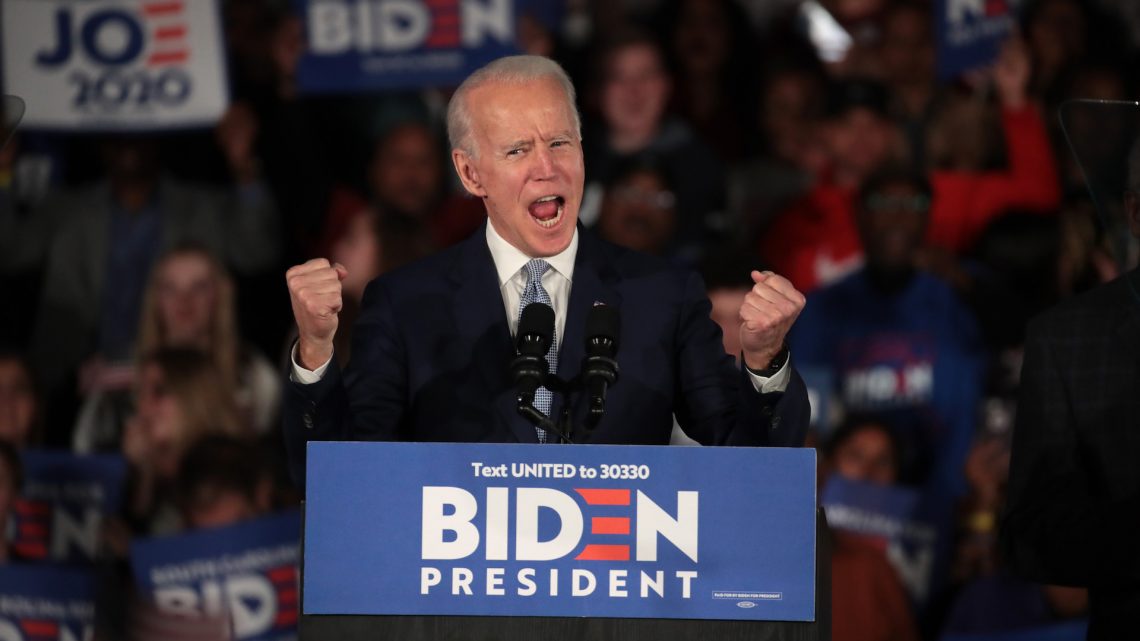
Biden’s Finally Raising Money After South Carolina. It’s Too Late to Help For Super Tuesday.
March 1, 2020LOS ANGELES — Joe Biden finally got his big win. The question is whether it came too late — or just in time.
Biden’s South Carolina romp helped him nearly catch Bernie Sanders in the delegate count, and gives him a badly needed momentum and fundraising boost heading into Super Tuesday after three straight losses. But he has been lapped by both Bernie Sanders and Michael Bloomberg on the airwaves in the 14 states that will vote on Tuesday, lacks Sanders’ ground game and even with a major post-South Carolina donations windfall has far fewer resources than either of his main opponents at this point.
Heading into Super Tuesday, by far the most crucial election night of the 2020 primaries, the fate of the Democratic nomination may come down to whether Biden’s momentum can overcome Bloomberg’s money to win the more moderate voters key to cementing his comeback.
"The big victory tonight definitely gives momentum to Joe Biden — but the window to take that momentum on the road before Super Tuesday is narrow,” said Democratic strategist Jesse Ferguson, who worked on Hillary Clinton’s 2016 race. “The big Mo only matters if people know you've got the Mo."
READ: Joe Biden just crushed Bernie Sanders in South Carolina
The 14 states that head to the polls on Tuesday combine for more than one third of the total delegates up for grabs in the 2020 Democratic primary process. That includes California, which alone accounts for roughly 10% of delegates, as well as states with big delegate troves including Texas, North Carolina, Virginia, and Massachusetts.
The big 'mo'
Momentum, or at least the self-fulfilling effect of reporters declaring momentum for candidates and polls and donors reacting to good or bad media cycles, also might matter much less going forward.
The first four states show that demographic differences played huge roles in how each state voted. In both the 2008 and 2016 Democratic primaries, the demographic voting patterns seen in early states more or less held throughout the campaign. Sanders’ voters aren’t going anywhere. But whether Biden bests Bloomberg on Super Tuesday could well determine who is strong enough to slog forward against Sanders.
Biden’s early state struggles compounded his weak fundraising, leaving his cash-strapped campaign able to commit only a six-figure sum on ad spending for Super Tuesday states. Compare that to Sanders, who’s spending close to $20 million on Super Tuesday ads, or Bloomberg, who’s already topped a half-billion dollars (that’s right, with a B) spent on ads so far, most of that on advertising across Super Tuesday.
His super PAC has spent about $1.5 million in ads. Sanders’ campaign announced Sunday morning that it had raised a whopping $46.5 million in February alone — almost double what they brought in in January. Biden’s campaign hasn’t released that figure yet, but raised $8.9 million in January and had just $9 million left in the bank as of the beginning of February.
READ: Here's Tom Steyer twerking with Juvenile because 2020 hasn't been weird enough
Biden’s fundraising numbers will undoubtedly spike after South Carolina — he said Sunday morning that he’d raised $5 million in the last 24 hours, his campaign’s best fundraising stretch. But that money didn’t come soon enough to be used on Super Tuesday.
“It is basically impossible for us to get up and get enough on TV to make a difference.”
“It is basically impossible for us to get up and get enough on TV to make a difference. So we are also actively planning for our March 10th and March 17th state budgets,” said Steve Schale, who’s helping run Biden’s super PAC.
Biden and Bloomberg are largely chasing the same voters: More moderate white voters, Hispanics and especially African Americans, who drove Biden’s big South Carolina win. Tuesday’s elections will have a number of minority-heavy states voting, making the election day arguably the best chance for both candidates to rack up delegates.
Facing Bloomberg's money
Bloomberg’s humongous ad campaign could help him win major troves of voters that otherwise would have gone to Biden, and the ongoing if weakened campaigns of Pete Buttigieg and Amy Klobuchar could pull from Biden as well. That not only makes it harder for Biden to win delegates, but since candidates have to hit 15% of the vote to win statewide delegates, he could be at risk of getting shut out in some states. Bloomberg’s campaign has most heavily targeted the same southern states Biden is relying on for his best performances: Texas, Virginia, Tennessee, North Carolina, Oklahoma, Arkansas and Alabama.
Bloomberg has plateaued and even lost some ground in polling since his disastrous debate performance in Nevada ten days ago and a better but hardly stellar debate in South Carolina last Wednesday. But it’s unclear how much voters will have heard about South Carolina by Super Tuesday — especially the type of low-information voters who have been especially receptive to Bloomberg’s ad deluge.
But as the early states proved, money alone can’t buy you love. Billionaire Tom Steyer spent over $200 million on ads, including $20 million in South Carolina alone. But he dropped out of the race Saturday night after finishing a distant third in the state. Biden spent less than $1 million on ads in the state for his dominant victory.
Early voting also complicates the picture. More than 3.2 million people including more than 1.5 million Democrats had cast their ballots in California, by far Super Tuesday’s biggest prize, before South Carolina voters even headed to the polls. Many more voters already cast ballots in North Carolina and Texas.
READ: Elizabeth Warren is an a very awkward fight with her own super PAC
But in many states there has been both anecdotal and limited data evidence that moderate voters worried about Sanders winning the nomination are holding their ballots, waiting to see whether Biden, Bloomberg, Pete Buttigieg or Amy Klobuchar stood the best chance of winning the nomination.
For Sanders, another question looms. His two strongest performances so far came in Iowa and Nevada, two caucus states (he won neighboring New Hampshire but underperformed his 2016 numbers by a lot more than he has in other states). He did much better in caucuses than primaries in the 2016 elections, but most states eliminated the caucus process for this election. Polling indicates otherwise, but there’s a chance that his organizing-heavy campaign structure and the outsized excitement of his supporters might mean he won’t do as well in primaries going forward.
It’s unclear how the next three days will play out. But Biden is back off the mat. And if he can capitalize on his momentum, crest past Bloomberg and win a serious haul of delegates on Tuesday, that could set up a long race were he and Sanders fight for every delegate.
“I think he has an excellent chance now,” said California-based Democratic strategist Ace Smith, who was a top adviser on Kamala Harris’s presidential race.
Cover: Democratic presidential candidate former Vice President Joe Biden celebrates with his supporters after declaring victory at an election-night rally at the University of South Carolina Volleyball Center on February 29, 2020 in Columbia, South Carolina. (Photo by Scott Olson/Getty Images)


